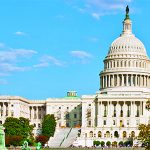On Friday, June 16, 2017, the bipartisan Congressional Civil Justice Academy held its first ever panel discussion on the Senate side of the US Capitol. Panelists took a look at the problems associated with multidistrict litigation and explored possible reforms. The Multidistrict Litigation (MDL) Act was passed in 1968 to address a perceived “explosion” in … Continue reading “The Growth of Multidistrict Litigation: Emerging Issues and Possible Solutions”
As the U.S. Supreme Court was set to kick off its 2017 term, court watchers had their eyes on a number of important cases involving civil justice issues that were likely to have far-reaching effects. Highlights involved collective-bargaining and the National Labor Relations Act, environmental litigation, the rights of terrorism victims when suing foreign governments, … Continue reading “Civil Justice Preview of the US Supreme Court’s 2017-2018 Term”
Around the country, businesses small and large have seen a surge in Americans with Disabilities Act-related lawsuits claiming failures to provide reasonable accommodations to customers and workers with disabilities. Critics call them “drive-by” lawsuits because many of the plaintiffs allege violations without ever getting out of their cars. A report on CBS’s 60 Minutes even suggested that … Continue reading “Americans with Disabilities Act Lawsuits: “Drive-By” Litigation or a Tool to Help the Disabled?”
Federal law requires generic drug manufacturers to use the identical warning labels as their corresponding innovator or brand-name drugs, and it forbids them from updating or adding to the language authorized by the FDA when approving those products. That means generic manufacturers cannot be sued for deficient warnings when patients using their drugs are injured. … Continue reading “Inventing New Liability? Who Should We Blame When Generic Drugs Harm Patients?”
With a new slate of Federal Trade Commission members soon to be confirmed, Members of Congress and other observers want to know how the agency will work to protect consumers from data breaches and unwanted privacy intrusions without stifling innovation and economic growth. The Commission is currently rethinking what constitutes “privacy harm” just as two … Continue reading “Privacy Challenges Ahead for New Federal Trade Commission Members”
The digital revolution and advent of Internet-based communications, entertainment, shopping, and social media platforms have been among the biggest contributors to the American economy and consumer welfare in the last two decades. But big technology companies – including Google, Facebook, Twitter, Amazon, and others – have increasingly been accused by those on both the political … Continue reading “Is Big Tech Too Big? Assessing Calls for Antitrust Investigations of America’s Technology Firms”
When then-Deputy US Attorney General Sally Yates issued a memorandum in 2015 instructing Department of Justice staff to prioritize the criminal prosecution of individuals in corporate misconduct investigations, observers viewed it as a sharp turn from prior DOJ enforcement priorities. Corporations would no longer be permitted to settle prosecutions unless they cooperated in the criminal … Continue reading “The DOJ’s Evolving Civil Enforcement Priorities: From the Yates Memo to the Brand Memo and Beyond”
Frustrated by what they perceive as a lack of progress on climate change-related regulation, a number of American cities, municipalities, and groups of concerned citizens are taking action into their own hands by filing lawsuits against fossil fuel companies over the industry’s role in global warming. San Francisco, Oakland, and New York, are among the … Continue reading “Climate Change in the Courts: A Perfect Storm of Litigation”

